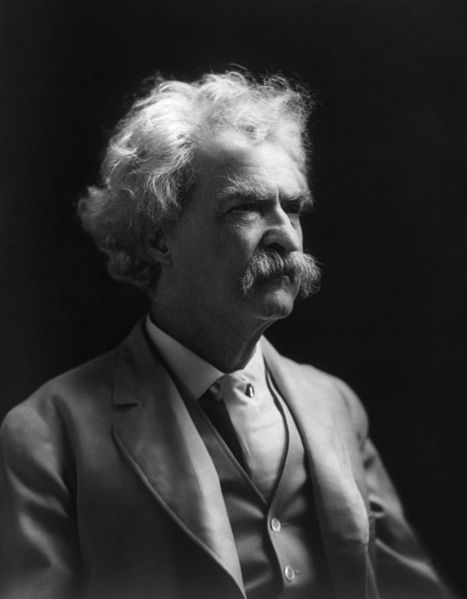Mark Twain's Roughing It
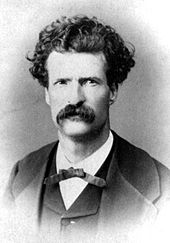
Lecture Notes from Mark Twain's Roughing It
Generation: Mark Twain is from the Guided Generation.
Mark Twain was born in 1835 and hails from the Gilded Generation. Like Thoreau, we will begin by looking at the period of history during which Twain's generation lived.
Note that we will be studying quite a few authors and outdoor personalities that come from the Gilded Generation. The following are a few events that occurred during their lives:
1830 - Mormon Church organized by Joseph Smith in Fayette New York.
1830's - Two Thousand miles of railroads built.
1841 - First Emigrant wagon trains for California.
1842 - Settlement of Oregon begins via the Oregon Trail
1845 - Thoreau begins building a cabin beside Walden pond. He stays until 1847.
1848 - Gold discovered in California. 80,000 prospectors emigrate in 1849
Gilded Generation: Rising Adults
1854 - Thoreau publishes Walden
1860 - First Pony Express between Sacramento, CA and St. Joseph, MO. Service ended the next year upon completion of the transcontinental telegraph line.
1861 - Abraham Lincoln is sworn in as the 16th President of the United States.
1861 - Confederate assault of Fort Sumter. Sumter surrenders. Civil War Starts
1865 - The Confederate States of America surrender at Appomattox Courthouse, ending the Civil War.
1869 - The Transcontinental Railroad is completed at Promontory Point, Utah.
Gilded Generation: Midlife
1872 - Congress establish first national park: Yellowstone
1873 - Banks failed. Panic begins in Sept. Depression lasts 5 years.
1890 - Idaho is the 43rd state admitted to the Union.
1890 - Battle of Wounded Knee, SD last major Indian battle
Gilded Generation: Elders
Sep. 14, 1901 - Theodore Roosevelt is sworn in as the 26th President of the United States.
Mark Twain: Background
1851 - Begins work as a journeyman printer with the Hannibal Gazette.
1857 - Becomes an assistant pilot on the Mississippi. Spends two years on the river.
1861 - Civil War breaks out. Twain serves a couple of weeks, and then leaves for Nevada with his brother Orion. (Twain describes his trip out west in one of our readings)
1862 - Works as a reporter in Nevada
1864 - Moves to San Francisco. Works as a writer.
1869 - Innocents Abroad is a big seller
1872 - Publishes Roughing It (from which our reading comes)
1873 - Publishes the Gilded Age (about corruption in business & politics)
1884 - Publishes The Adventures of Huckleberry Finn
1890's - Goes into debt
1895 - Begins a worldwide tour to pay off debts
1898 - Completes paying off debts
1910 - Dies.
Background Information: Overland Stage Coach - Pony Express - Overland Telegraph
In the first reading, Twain takes the Overland Stage to Carson City in the Nevada Territory. It is interesting to take a closer look at the stage - and the Pony Express - both of which used the same route.
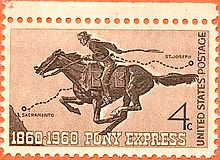 The Pony Express only lasted for 18 months (1860-1861). The completion of the overland telegraph system on October 26, 1861 spelled the end of the Pony Express. The last run was made in late October 1861.
The Pony Express only lasted for 18 months (1860-1861). The completion of the overland telegraph system on October 26, 1861 spelled the end of the Pony Express. The last run was made in late October 1861. The distance by the Overland Stage from Atchison, Kansas (in the upper northeast corner of Kansas) to Placerville, California was 1,913 miles. Including Atchison and Placerville, there were 153 stations, averaging about twelve and one-half miles apart. Drivers changed horses 10 or 12 times in 24 hours, taking four minutes to do so.
The coach would ordinarily make a 100 or 125 miles a day with only brief stops at the swing stations to change the horses.
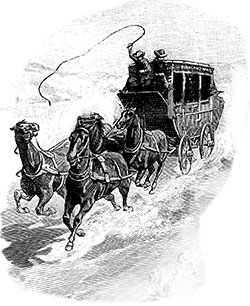 The stage line lasted from 1861 to 1869. It became obsolete when the Transcontinental Railroad was completed in 1869.
The stage line lasted from 1861 to 1869. It became obsolete when the Transcontinental Railroad was completed in 1869.The following comes from a Wells Fargo posting about the stage line:
1. Abstinence from liquor is requested, but if you must drink, share the bottle. To do otherwise makes you appear selfish and unneighborly.
2. If ladies are present, gentlemen are urged to forego smoking cigars and pipes as the odor of same is repugnant to the Gentle Sex. Chewing tobacco is permitted, but spit WITH the wind, not against it.
(And so on...)
Readings from Roughing It
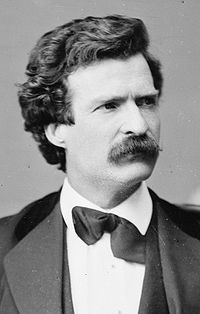 Prior to Clemens' journey to Carson City, he was a river boat pilot on the Mississippi River, but the Civil War changed all that. Clemens didn't want to fight in the Civil War and wasn't interested in politics.
Prior to Clemens' journey to Carson City, he was a river boat pilot on the Mississippi River, but the Civil War changed all that. Clemens didn't want to fight in the Civil War and wasn't interested in politics.
His brother Orion had just been appointed the Secretary of the Nevada Territory. The Nevada Territory was important to the Union effort because gold and silver had been discovered there. A rich deposit was being worked at Virginia City, northeast of Carson City where the Union had established the territorial government. His brother's appointment gave Clemens a good excuse to get out of the war.
Twain and Orion left from St. Joseph, Missouri by Overland Stage for Carson City on July 26, 1861, and arrived in Carson City on August 14 (a total 20 days). The only time off was a day Aug 6-7 in Salt Lake City.
First Selection: Twain's Trip to Carson City
Twain says that it cost $150 for the stage coach fare. Actually, Twain got it wrong. It was $200 per passenger. Three months later when the departure point of the stage was changed to Atchison, Kansas, the fare was reduced to $150.
Twain makes fun of the Smith & Wesson seven-shooter. First introduced in 1857, it was a 22 caliber pistol which weighed 8 ounces and sported a barrel that was less than 4 inches long. It was not accurate beyond 10-15 yards. Larger caliber guns were the rule and many considered the seven-shooter a toy.
Twain has even more fun with the Allen Revolver. It was not really a revolver (which has one barrel) but a small caliber pistol with six barrels. The pistol was first manufactured by Ethan Allen in 1837. Each time the hammer was cocked the barrels rotated in place. Twain called it a pepper box because from a front view it resembled the holes in a pepper shaker. It wasn't accurate beyond a range of few feet.
Twain and his brother were ferried across the river at St. Joseph. They traveled on the stagecoach across Kansas (which was a state in January of 1861), and left the states behind once in Nebraska which at that time was a territory.
They rode on a Concord Coach which was manufactured in Concord, New Hampshire (pictured below). It was the standard stage used by western stage companies. The coach rested on great leather straps (called braces) which caused a swaying effect. Dampening the load, it provided a pleasant ride for the passengers and was easier on the horses.
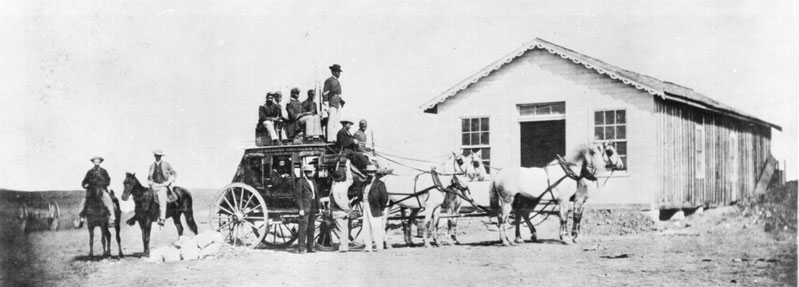
Twain talks about "delayed mails." A southern mail route had been interrupted by the Confederates and mail from that route had been re-routed to St. Joseph. At the same time, steamers couldn't depart the New York harbor and the New York mail was also diverted to St. Joseph.
In order to lighten their loads, Overland drivers would sometimes stash mail (particularly magazines, newspapers, and books) for the later stages to pick up. By 1862, so much mail was accumulating that some of it was destroyed by Overland officials disguised as Indians.
One literary allusion found in the first reading is "The fountains of her great deep are broken up." That comes from Genesis 7:11-12. "In the six hundredth year of Noah's life . . . were all the fountains of the great deep broken up. And the rain was upon the earth forty days and forty nights."
Mark Twain's Route (the Overland Route) is illustrated below:
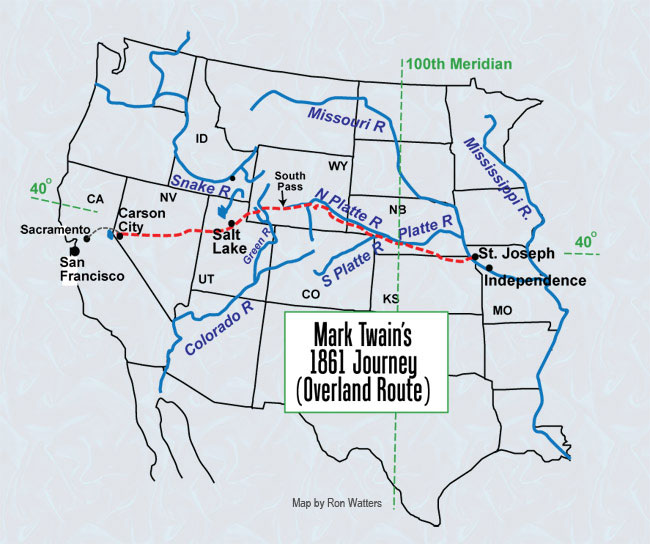
Second Selection: Reaching South Pass
South Pass City is where the Overland Route left the Sweetwater River (an upper tributary of the North Platte River).
 South Pass, at 7,550 feet, is farther beyond South Pass City and sits on the Continental Divide. It's a long, treeless valley, 25 miles wide. From it, several mountains over 12,000 feet can be seen. Twin makes a comparison between western and eastern mountains, referring to Mt. Washington which is the highest peak in the New Hampshire at 6,288 feet.
South Pass, at 7,550 feet, is farther beyond South Pass City and sits on the Continental Divide. It's a long, treeless valley, 25 miles wide. From it, several mountains over 12,000 feet can be seen. Twin makes a comparison between western and eastern mountains, referring to Mt. Washington which is the highest peak in the New Hampshire at 6,288 feet.
Twain mentions a spring with two outlets, one flowing to the Pacific and one flowing to the Gulf of Mexico. Alas, Twain had it wrong. Indeed, there is a spring on the western side of the Divide. But its waters flow to the west. The Atlantic and Pacific separation is at the top of the pass.
The last paragraph in the South Pass reading was greatly reduced by Twain. This is the original:
The incident had such a gentle air of romance about it that I was subdued into a view of thoughtfulness, as I sat dreaming of the wanderings of my leaf across the continent, and the vague possibility that many weeks to come she might take it out of the water as it drifted by the old city and by the unerring instinct of love know instantly the tender freight it bore, the tears came to my eyes. However, where of reflected that I had forgotten to put a postage stamp on it.
After he re-working it, he ended up with the following:
I freighted a leaf with a mental message for the friends at home, and dropped it in the stream. But I put no stamp on it and it was held for postage somewhere.
Third Selection: A Camping Trip to Lake Tahoe
This reading is about a trip that Twain takes to Lake Tahoe. In the reading, Twain refers to Flavius Josephus (AD 37-100). He is a Jewish historian. He also refers to the "Brigade Boys," a group of several men that were planning a small timbering operation along Lake Tahoe.
Fourth Selection Twain's Winter Journey: Background Information
In December, Clemens got a terrible case of silver fever and became as mad as the other miners. He and three friends bought a decrepit wagon and loaded it with 180 pounds of provisions and headed for the Humboldt Mining District - in the middle of an Nevada winter.
Each man had their own horse and two "miserable horses" pulled the wagon.
"We could have accomplished the journey in 10 days," wrote Twain about the journey in a letter, "if we had towed the horses behind the wagon."
A prospecting party they met along the way had a better idea, suggesting that they would make even better time if they put the horses in the wagon.
They camped at New Humboldt Sink for two days and tried to drink the brackish water, but it was like drinking lye.
Finally they reached Unionville. At that time, Unionville was a camp of 11 cabins and a flag pole. They built a crude shelter of rock and shrubs. "Indeed it is a great source of gratification to me to review my efforts up therein the gulch," he wrote. "If I do possess one shining talent, it is that of building willow houses out of rocks and dirt."
They poked around searching for gold and silver. In time, the men found an outcropping of quartz, made a written notice and posted a claim. Their plan was to sink a shaft and strike ore. After a week of hard labor, Clemens had enough. There were much easier ways to make money, and after a fortnight of arriving at Unionville, he was on his way back to Carson City.
It was on the men's approach to Unionville, between Honey-Lake Smith and Dead Well Station (stations of the Overland Stage Route), where Twain's story of surviving the winter's night take place. The map, below, shows the location of the ordeal.
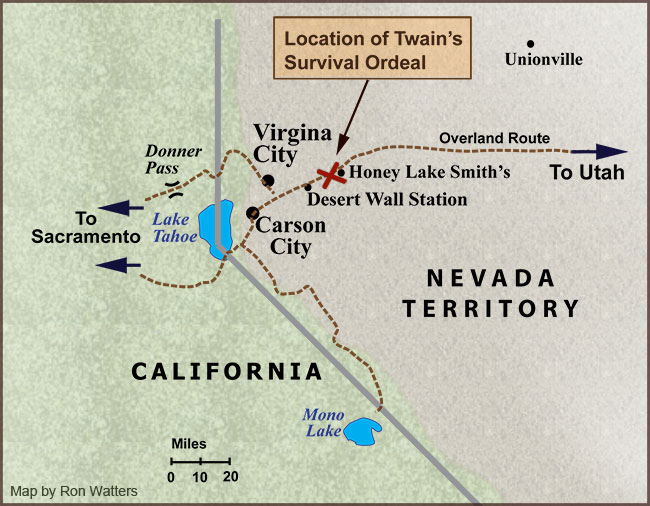
His companions on the journey were:
2. Capt Hugo Pfersdorft - a pioneer of Unionville and the district recorder. This is probably the person that Twain calls Ollendorf in the story. Ollendorf is the Prusian. Earlier Twain writes "he is not the party who has inflicted so much suffering in the world with his wretched foreign grammars." By "the party who has inflicted so much suffering," he is referring to Heinrich Gottfried Ollendorff who was a 19th Century teacher of languages living in Paris. Starting in 1830's, Ollendorff published foreign language textbooks - and Twain, apparently, had suffered through one.
3. Mr. Ballou - This is probably Mr. Tillou, a 60-year old blacksmith. Clemens enjoyed him and called him "Dad" or "the old man." He was a lovable comical fellow and would use a strange vocabulary. Twain, of course, couldn't resist poking alittle fun at Dad, saying: "What Mr. Tillou customarily meant, when he used a long word, was a secret between himself and his maker."
Portrait of Mark Twain the year before he died . . .
_________
Pub History: This page was originally located at the following URL:
https://www.isu.edu/~wattron/OLNotes4.html
[End]

